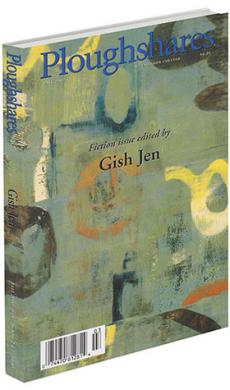rev. of Some Ether by Nick Flynn
Some Ether
Poems by Nick Flynn. Graywolf Press, $12.95 paper. Reviewed by Tony Hoagland.
Someday the term confessional will seem as quaint and obsolete as a fainting couch, and we will have a new terminology, one that feels more discriminating. In the meantime, we have Nick Flynn’s compelling poems, which turn some rather extreme autobiographical details of a life this way and that, like a snow globe in the hand of the dazed survivor of a battle. Dazed but curious, connected but detached, attentive but distant, present but disturbingly enmeshed in the long sticky tentacles of memory.
The poems of Flynn’s first book,
Some Ether, revolve around the central story of a mother’s suicide and the traumatized, dreamy disconnectedness of her survivor. But the book’s gift is not the sensationalism of the tale, but the delicate kiltered skill with which the poems collage anecdote and metaphor into allegory: “Every day, something — this time / a French ship with all her passengers and crew / slides into the North Sea, the water so cold / it finishes them. Nothing saved / but a life ring stenciled GRACE, / cut loose from its body. / A spokesman can only / state his surprise / that it doesn’t happen more often. / . . . For years I had a happy childhood, / if anyone asked I’d say,
it was happy” (“The Captain Asks for a Show of Hands”).
I’ve been reading these poems in magazines for years, and still find great freshness in Flynn’s arrangement of images, and especially the elegant, unwinding syntax of certain poems (“Flood,” “How Do You Know You’re Missing Anything?”). More and more, though, I’ve come to realize how much this collection is concerned not just with memory, but with the subtleties and paradoxes of telling itself. The crucial dilemma for the speaker comes to seem how loyalty to the dead prevents ever living fully in the present. How the stories we most treasure are addictive as heroin is treated in “Cartoon Physics, Part II”: “More than once / I traded on this until it transmuted into a story . . . / I’d recite it as if I’d never told anyone, / and it felt that way / because I’d try not to cry yet always / would & the listener / would always hold me . . .”
One of the therapeutic premises of confessionalism, of course,
is that earnest speech is a healing act. One of the integrities of
Flynn’s book is that it doesn’t make any such promise. There is no clear indication that the speaker’s damage can be triumphed over — no promise that any of us recover from anything. “Emptying Town” is just one refutation of the confessional mode: “You know the way Jesus / rips open his shirt / to show us his heart, all flaming and thorny, / the way he points to it. . . . / My version of hell / is someone ripping open his / shirt & saying, / look what I did for you.”
Some Ether combines nakedness, elegance, and emotional intelligence. The poems are beautifully clear in their particulars and meanings. And the question of whether or not the speaker can awaken from the dream of the past, whether telling can effect this self-redemption, whether confession
works, is a deeply affecting drama.
Tony Hoagland’s first collection, Sweet Ruin,
won the Brittingham Prize in Poetry and the John C. Zacharis First Book Award, and his second collection, Donkey Gospel,
won the James Laughlin Award.

